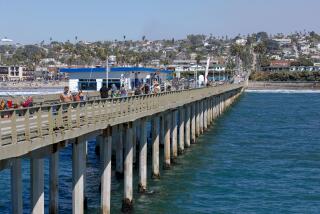No Aid to Seal Beach Sea Wall
- Share via
Gov. Gray Davis has vetoed funds to rebuild a sea wall that protects the Seal Beach Pier and surrounding shoreline from erosion, alarming city officials who fear the 42-year-old wall will crumble within a year.
The wave-battered wall, just north of the pier, represents Seal Beach’s first line of defense against erosion that has been slowly eating away the city’s beaches for decades.
The state was poised to provide $495,000 of the $600,000 needed for the two-year project, but Davis’ veto has officials scrambling for ways to shore up the sea wall.
In addition to fighting erosion, the sea wall also protects the pier’s massive wood pilings against choppy surf--the type of waves that brought the pier down during fierce El Nino storms in 1983. City officials expressed concern that the pilings could again be weakened if the sea wall is not replaced.
The city has been making patchwork repairs on the 900-foot wall for years but more extensive--and expensive--work is needed. Workers recently completed emergency repair work where waves punched a large hole in a section of the concrete pilings. The hole “got bigger and bigger, and it was jeopardizing the entire structure of the wall,” Councilman Shawn Boyd said.
The fixes “won’t last forever,” Boyd said. “We will have a real problem in a year.”
The city said the community of Surfside would be the hardest hit if the sea wall fails. The neighborhood south of the pier has seen its coastline dwindle from 300 yards of sand a few years ago to about 75 feet now, Boyd said, and more erosion will occur if the sea wall isn’t replaced.
“Without the money we asked for, we’re out of luck,” Boyd said.
Erosion at Seal Beach has been a problem ever since the Navy built a series of jetties at the mouth of Anaheim Bay and the San Gabriel River to help calm the waters while loading and unloading munitions from ships at the Naval Weapons Station.
The sea wall is considered one of the most cost-effective methods of controlling beach erosion. Another tactic--replenishing beaches with new sand--is much more expensive.
The funding for the wall repair was proposed by Assemblyman Tom Harman (R-Huntington Beach) and approved by the Assembly. But Davis vetoed the funding along with a variety of other smaller projects Harman proposed.
The funds were part of a large package of government projects that had to be cut from the budget because of “fiscal constraints and limited resources in the general fund,” said Sandy Harrison, a spokesman for the state Department of Finance.
Seal Beach--one of Orange County’s smallest cities--said it simply doesn’t have the money to make these repairs.
“There is not a contingency plan,” Boyd said. “We have to find some way to get our hands on this money.”
The city is now focusing on its next move, but officials worry the price tag will increase with time.
“We hope [the emergency repair work] lasts until we can get the funds to do the permanent fix,” City Manager John Bahorski said. “The concern is that the more time it takes, the more expensive it’s going to be.”
(BEGIN TEXT OF INFOBOX / INFOGRAPHIC)
Shifting Sands
Source: City of Seal Beach
More to Read
Sign up for Essential California
The most important California stories and recommendations in your inbox every morning.
You may occasionally receive promotional content from the Los Angeles Times.









